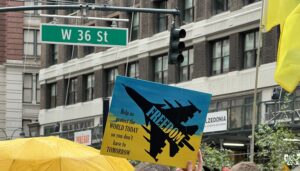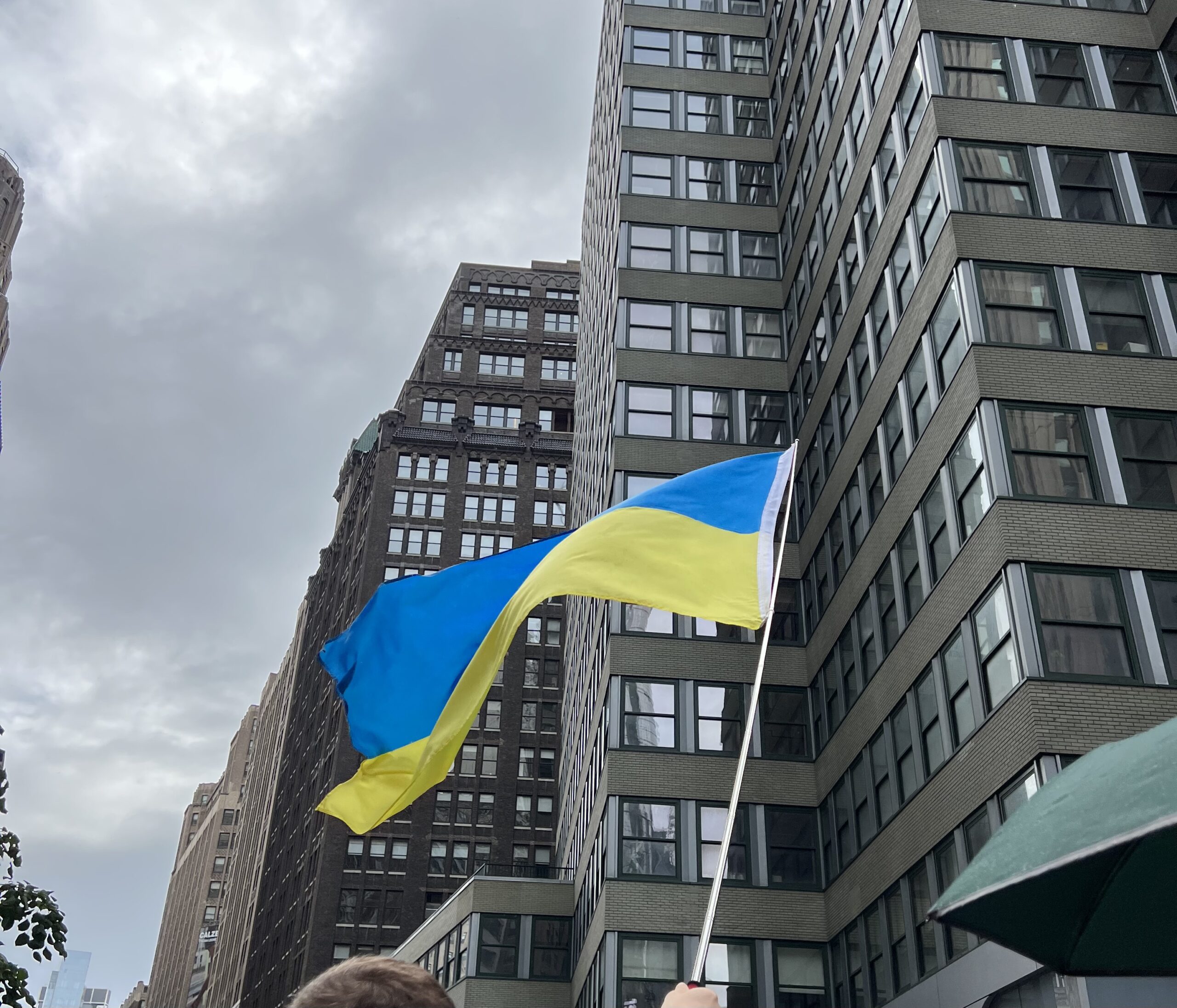
Dozens of Ukrainians, Ukrainian Americans, and their supporters marched through the rain from Times Square to Herald Square in Manhattan on Saturday, October 7, demanding an increase in aid to Ukraine, and a continuation of the fight against Russian imperialism.
The group, covered in blue and yellow and carrying Ukrainian flags, chanted slogans like, “Russia is a terrorist state” and “Stand with Ukraine,” interspersed with chants in Ukrainian. Handmade signs read, “Kids deserve to live” and “Help us protect the WORLD TODAY so you don’t have to TOMORROW.”
New York City is home to the largest Ukrainian community in America. Russia’s February 2022 invasion and the ensuing war has greatly affected the diaspora, as many still have family remaining in Ukraine. While international support for Ukraine was initially very strong, recently that support has diminished among certain politicians, who believe it’s no longer their responsibility to provide aid. Slovakia, Ukraine’s neighbor, is one example whose recent parliamentary elections resulted in a victory for a populist candidate in favor of limiting aid to Ukraine and negotiating with Russia. Ukrainians in New York, however, don’t want the world to forget about their struggle.
The sponsor of the march, Svitanok NYC, organizes protests and marches across New York City to demonstrate support and solidarity for Ukraine, encouraging both financial and military aid to Ukraine to assist in the war effort. Svitanok’s president is 20-year-old architecture and political science student Oleksandr Taran. “We are very grateful for American support and we want to convey this properly,” he said.
“We want to make sure that the message regarding support for Ukraine is pro-democratic,” Oleksandr said before the march began. “What we should all do together is make sure we unite our efforts in properly dealing with Russia and their aggression and their war with Ukraine, which is horrible. The amount of death of civilians, war crimes committed, it’s unthinkable, and there is plenty of proof.”
Oleksandr gave very compelling reasons why countries far from Ukraine, such as the United States, should not only support Ukraine in defeating Russia, but should be cognizant of pro-Kremlin propaganda. “It should be our common interest to make sure we do not allow the Kremlin’s misinformation to spread, since misinformation might affect support for Ukraine, and that can directly lead to consequences in the war,” he said.
The objective of the march was not to request a specific amount of financial or military aid to Ukraine, but more so to warn against the dangers of what may occur in the future if Russia were to overpower Ukraine, and to encourage the international community to remain committed to assisting Ukraine at a time when interest in sending support is starting to wane.
“If Ukraine falls, God forbid, if that happens, NATO is next, NATO territory. And that will mean that American boys will have to go overseas and fight. We don’t want a third world war,” Oleksandr said, “which is very possible with world security compromised.”
Another Svitanok organizer, a Ukrainian named Vsevolod, had a similar message, saying that Russia is “very strong and they have a lot of resources,” and that they show “not the real picture.” He went further, saying that what Russia has done to Ukraine is equivalent to a terrorist attack, and what is happening between the two countries is not “just a small conflict, it’s a full-scale invasion.” His strongest point was that “the whole world should support Ukraine.”
Oleksandr led the 10-block march dressed in a suit and holding a megaphone, informing both the marchers and the general public walking by of Ukraine’s plight. “This is a common fight against worldwide evil,” he shouted to the crowd.
He echoed many of these sentiments while marching. “Russia is committing terrorism in Ukraine,” he said into the megaphone. “Ukraine is fighting not just for itself, it’s fighting for worldwide security.”
Frank Hickey, a frequent attendee of pro-Ukraine events in New York City, has witnessed some of the war firsthand as a humanitarian worker helping refugees in the Ukrainian port city of Kherson. He had done similar humanitarian work for two months in Moldova, as well as three months in Israel and two months in Poland.
A former detective in New Mexico, the Brooklynite has also spent time in Ukraine as an English teacher. “Even now they don’t find enough Ukrainians who qualify in English to fly the F-16s,” he said. “You need a technical vocabulary.” He doesn’t believe his work in Ukraine is over. “I’m gonna go back,” he said.
Frank admitted how the war has affected him. “This Ukrainian war bothers me beyond words. I can’t explain why it bothers me, I’m not Ukrainian,” he said. “But it seems to me a human tragedy, a human dilemma.”
The march ended near Herald Square and concluded with a speech delivered by Oleksandr to the marchers circled around him and anyone nearby.
He mentioned the attack on the village of Hroza in Ukraine just days earlier that killed more than 50 civilians. “They do it openly,” Oleksandr said, referring to Russian attacks. “They don’t hide this. They are proud of this.” Ukraine, a country that is, as he put it, “between Russia and NATO,” is fighting for “democracy, for liberty, against imperialistic ambitions.”
“Putin, one person in power,” Oleksandr said, “started a bloody war.” He turned away from the marchers to address bystanders at the intersection of Sixth Avenue and Broadway. “Ukraine is fighting a common fight. This is why we’re here today,” he said. “We’re grateful for your support, but we need more in order to win. We cannot let a dictator win this war. We cannot let a country occupy another country.”
“If Ukraine falls, they will go to Poland,” Oleksandr continued, referring to Putin and Russia. “That is NATO territory. Your boys will go overseas. Let’s not let that happen.” He then restarted the original chant: “Support Ukraine, stand with Ukraine.”
He also brought up military support for Ukraine. “We don’t want to run,” he said, speaking of Ukrainians, “but we need weapons to fight that evil. We need weapons to fight Russia,” a country that has “killed thousands of our people.” He finished his speech to the onlookers by repeating a frequent statement from the march: “Russia is a terrorist state.”
Vsevolod and Oleksandr then addressed the group of marchers in Ukrainian, which was followed by an emotional rendition of the Ukrainian national anthem.
Oleksandr is passionate about raising awareness and bolstering support for Ukraine on a personal level. “I was born in Ukraine, my family is over there, some of them are in occupied territory,” he said. “It’s a very personal tragedy, but we are hoping that with our common efforts, our common strength, we can overcome this war, win this war.”








